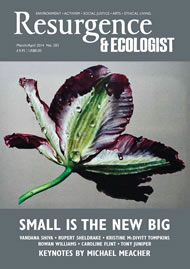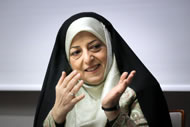The tide is cautiously on the turn in Iran. New international dialogues, amplified women’s voices, the country’s first female Olympic athletes, action on environmental concerns – a new version of this Islamic Republic is surfacing. And if you look behind many of these milestones you’ll find a woman who has been offering consistent leadership on both national and global priorities.
That woman is Masoumeh Ebtekar, and in 1997 she became the country’s first female vice president since the Islamic Revolution. Ebtekar was selected by leader Mohammad Khatami, saying at the time that if more women were promoted on merit, many of Iran’s problems would be solved. In September 2013 she was reselected by reformist president Hassan Rouhani. Ebtekar has been calling for a national dialogue on the social and religious restrictions faced by Iranian women. And beyond Iranian society she is working with President Rouhani to promote an atmosphere of moderation in relationships with the wider world, particularly the West.
“Together, the US and Iran could work against violence, against radicalism, against militarism in this part of the world, which would lead to regional and global peace and stability,” Masoumeh told the US’s ABC News.
Any relationship with the US will likely be nurtured by Ebtekar’s six years’ suburban upbringing in the country, and her role as the only English-speaking spokesperson in the 1979 hostage crisis at the US embassy during the Islamic Revolution. She was a regular sight on TV stations for days, often translating for American journalists. Ebtekar became known to Americans as ‘Mary’, in an example of her cross-culture connection in the midst of a tense situation:
“I thought I would introduce myself as someone in between, trying to make a connection, and I would use a name that would be meaningful for another culture…so I chose the name Mary.”
Ebtekar has spent the years since then encouraging these ties with the West, and is now using this as a platform to advocate for sustainable development. “The people’s involvement can create a great force for the protection of the environment,” she says.
This conviction led to her appointment as head of the Environment Protection Organization of Iran. She has plans to establish environment committees within city and village councils, and to revitalise NGOs for environmental protection. These city and village councils have a potential that can help move the nation towards sustainable development. In the past she has led efforts to tackle air pollution in Tehran, to protect marine life in the Gulf, and to overcome environmental damage caused by the Gulf War in 1991.
At the time of writing, the US had left core sanctions on Iran in place, despite an interim nuclear deal being recently agreed. Environmentalists were warning that those sanctions were reversing hard-won environmental achievements by limiting access to advanced technologies that could alleviate air and water pollution. But Ebtekar sees nuclear negotiations as another way to foster Iranian–American relationships – even if that journey takes time. Sensing the spirit of transformation in Iran, she expresses deep hope that this will be felt both in Iran and within wider dialogues, and that it may lead to partnerships on cross-cutting issues like conservation and the environment.
Over the course of Ebtekar’s eight years at the Department of the Environment, Iran saw a heightened prevalence of civil society activism, suggesting greater nationwide awareness of social and environmental concerns.
Ebtekar has encouraged this awareness with her speeches at the Meeting of Women Leaders on the Environment (Helsinki) and the World Summit on Sustainable Development (Johannesburg), and through chairing the International Conference on Environment, Peace, and the Dialogue among Civilizations and Cultures. The United Nations Environment Programme named her one of the seven Champions of the Earth in 2006, acknowledging her impact at policy level in her region of the world. In 2012 she was included in the Muslim500 list as one of the 500 most influential Muslims in the world.
Ebtekar holds a PhD in Immunology, and in addition to academic publications in this field, she has numerous research publications on women’s issues, civil society and sustainable development. Her theoretical understanding complements her deep personal commitment to these issues.
The breeze of change and moderation blowing in Iran is quickening an environmental movement in the country. Women, often seen globally as the victims of environmental degradation, are also change-makers who manage and care for families, communities and their environment. And Ebtekar is a change-maker who, in the context of a more accessible government – President Rouhani encouraged cabinet members to open personal Facebook pages for better approachability – is amplifying the voices of previously unheard women and environmentalists, and energising both veteran NGO workers and young activists.
Environmental activism in Iran is taking on a renewed importance and cautious optimism, having been suffocated during the Ahmadinejad administration. And in September 2013, the US Treasury Department announced a general licence to support humanitarian aid – including environmental work – in the country.
In a statement referring to Russia’s detainment of the ‘Arctic 30’ Greenpeace activists at the end of last year, Ebtekar said: “No government is expected to stand against civil institutions and environmentalists who are worried about the future of the Earth.” Using the platform of her own position in government, Masoumeh Ebtekar is offering an alternative leadership focus that supports a civil society, a nation and a planet that unite on issues that are bigger than borders and politics.








